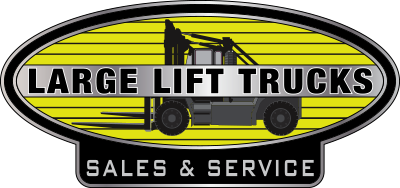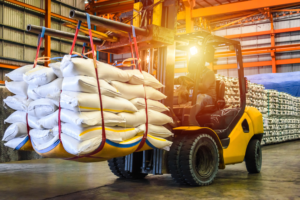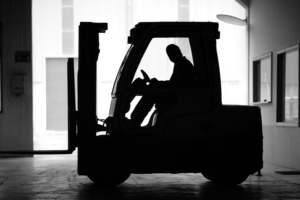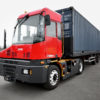YARD JOCKEY: JOB DESCRIPTION, REQUIREMENTS, AND RESPONSIBILITIES
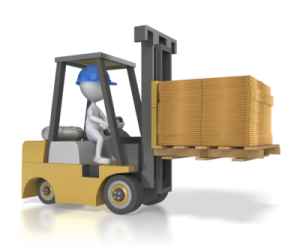
Yard Jockey: Job Description, Requirements, and Responsibilities
Being a yard jockey is a pretty decent job! Yard jockeys focus on moving semi-trailers in a safe manner and may have other responsibilities related to safety.
Who wouldn’t love a job that involves being active, social and allows you to drive heavy machinery? Believe it or not, this job actually exists, and you don’t even need a mountain of qualifications to do it. That job is that of a yard jockey, and it could be your next occupation.
The yard jockey moves semi-trailers around a yard, unloading and offloading valuable loads. Below, we provide our must-know guide on the duties of a yard jockey.
What Is a Yard Jockey?
A yard jockey is one of the most important positions at a site or warehouse. Without the yard jockey, the whole operation will stop working, as they are responsible for the movement of the many trailers around a yard.
The yard jockey will move trailers to and from the loading dock. When a truck driver comes to an operation to pick up their load, the yard jockey will have moved it into place so that it is ready for them. In a single shift, a yard jockey can move around 100 trailers.
Does a Yard Jockey Need a CDL?
As the position does not require driving off the private property of the company, yard jockeys do not need a Commercial Drivers License (CDL). If the jockey does need to leave the property, then they will not be able to do so as a truck driver. For reasons of flexibility, many employers may prefer you to have a CDL in case of emergencies.
Some companies may also require you to have additional qualifications. These may include a high school diploma, a GED, or even a clean driving record.
What Are the Responsibilities?
The job of a yard jockey is not simply to move loads. In fact, they are responsible for a lot more on the site or plant at which they operate. The first task is that they must maintain an orderly storage lot, maximizing the efficiency in which they and others can move loads.
They must operate the yard trucks, working in a safe way during the load on, and load off procedures. All driving is usually kept under 15 mph to minimize the risk of accidents. They must both empty and replenish containers.
Very often, they will be assigned the task of regular vehicle maintenance. When applying for a position, any prior knowledge or experience regarding vehicle maintenance or mechanics would be a bonus. As the vehicle is often on concrete, asphalt, and gravel surfaces in a dusty, dirty environment, required maintenance can be very frequent.
Basic knowledge of mathematics is required for the duties involving inventory and record keeping. Tare weight, gross weights, net weights, and container numbers need to be logged by the source and type of material. The security of these valuable items and the area itself is also the partial responsibility of the yard jockey, who must account for goods in transit.
A yard jockey must have extremely good communication skills, as they must interact with other employees and visitors constantly. Communication is usually done by cell phone or two-way radio. They must comply with safety regulations, and undertake any other tasks assigned by the supervisor.
How Much Does a Yard Jockey Earn?
On average, a yard jockey in the US earns around $16 per hour. This equates to around $36,000 per annum. However, prior qualifications, location, and the company you work for can all raise the rate of pay.
Many companies will also offer an attractive benefits package with this position. This can include flexible schedules, paid vacation, 401k, and health insurance.
What Do Yard Jockeys Drive?
Yard jockeys will typically drive a terminal tractor. This is the primary vehicle for moving trailers around a yard, though not public roads and highways. It is essentially a semi-tractor with some differences, mainly the shorter wheelbase.
A terminal tractor can fit one person inside the cab, which is made from 12 gauge steel to protect the worker inside. The cab has a 360-degree view and is accessed by a rear cab door. This is very useful as the jockey will be constantly climbing in and out of the cab all day.
Certain types of tractor will allow the driver to connect and disconnect lines without leaving the comfort of their cab. Ottawa trucks are one of these types of trucks.
Terminal tractors have a solid axle rear mount with an automatic transmission.
Lifting ability is provided by a fifth wheel coupling. It is integrated and the legs can stay in a low position while loads move.
What Are the Pros and Cons?
If you are currently a driver, a job as a yard jockey can be a much better way of living than long-distance, road haulage. It allows you to do hours more conducive to family life, not having to go long distances and stay overnight.
As the yard jockey is working in a loading and unloading environment, there are some physical dangers. However, these are no more than anyone on a building site or warehouse would normally face.
One injury that can afflict a yard jockey is an injury caused by the landing gear. The gear must be cranked by hand, which can put a strain on the shoulders and elbow. If the hand crank breaks free from the control of the operative and cranks automatically and rapidly, it can cause serious injury.
Your Next Occupation
Now your interest in the job of a yard jockey is piqued, get searching online for any vacancies. There are sure to be some in your local area and if not, you can prepare by brushing up on your qualifications and licenses while you wait.
For any truck and heavy machinery needs in the Houston area, Large Lift Trucks should be your number one stop. We offer sales, service, and parts for all your machinery needs. Visit our blog today, so you can find out even more about employment and jobs in the machinery industry.
Frequently Asked Questions about Yard Jockey
Are yard jockeys responsible for trailer inspections?
Yes, yard jockeys often conduct basic inspections of trailers, checking for any visible damage, ensuring lights and brakes are functioning, and verifying that trailers are properly secured.
What safety equipment do yard jockeys use?
Yard jockeys commonly use safety equipment such as high-visibility vests, gloves, and sometimes helmets or protective footwear, depending on the facility’s safety regulations.
Can yard jockeys work in different types of facilities?
Yes, yard jockeys can work in various facilities, including warehouses, distribution centers, manufacturing plants, and intermodal terminals, adapting their skills to the specific requirements of each site.
What is the importance of yard management software for yard jockeys?
Yard management software helps yard jockeys by providing real-time information on trailer locations, movement schedules, and task assignments, enhancing overall efficiency and coordination.
Can yard jockeys advance to other positions?
Yes, yard jockeys can advance to other roles within logistics and transportation, such as truck drivers, warehouse supervisors, or logistics coordinators, with additional training and experience.
What are the typical working hours for a yard jockey?
Yard jockeys often work in shifts, which can include nights, weekends, and holidays, depending on the operational needs of the facility.
How does a yard jockey differ from a truck driver?
Yard jockeys work within a confined yard or facility, moving trailers short distances. Truck drivers transport goods over longer distances on public roads and highways.
